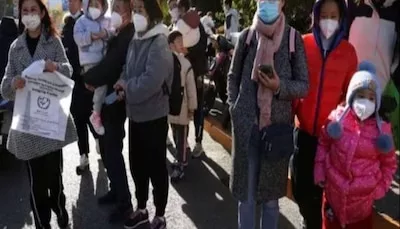Exporters raise concern over growing respiratory illness in China

Exporters raise concern over growing respiratory illness in China
By: Pune Pulse
November 29, 2023
Exporters are worried about the effect of the rising number of respiratory illnesses in China, which is India’s fourth largest export market.
They fear that this could further dampen consumption and disrupt the supply of crucial raw materials such as Active Pharmaceutical Ingredients (APIs) and Electronic Integrated Circuits (EICs) that are vital for India’s rapidly expanding electronic and pharmaceutical manufacturing industry.
This issue comes at a time when India’s goods exports have already seen a significant decrease due to weak demand from Europe and the United States, attributed to high interest rates stemming from the Russia-Ukraine war and geopolitical tensions in the Middle East, including the Israel-Hamas conflict. In October, there was an uptick in the export of engineering, electronic, and pharmaceutical products in major markets like the US and Europe, but the situation in China is quite different.
The ongoing property sector crisis in China has led to a continuous decline in the export of these items, with a significant drop of 28 per cent to $15.32 billion in FY23, while imports increased by 4.16 per cent, reaching $98.51 billion. According to Ajay Sahai, head of the Federation of Indian Export Organisation (FIEO), exporters are concerned about the challenges China is currently facing that have affected demand.
While there is no immediate danger as they have a stock of inventory that can last for two to three months, it is vital to control the spread of these challenges. In October, India witnessed a decline in its engineering goods exports to China, with a drop of more than 18 per cent to $213.24 million, compared to the previous month’s figure of $260.30 million.
Engineering exports contribute to 24 per cent of India’s total merchandise exports. Arun Kumar Garodia, Chairman of the Engineering Export Promotion Council of India (EEPC), stated that while engineering exports have shown improvement in regions like Australia, Russia, Saudi Arabia, the United Kingdom, and the US, they have been declining in China. This decline in exports could further worsen due to the increasing prevalence of respiratory illnesses in China.
India’s pharmaceutical industry heavily relies on the supply of Active Pharmaceutical Ingredients (APIs), which are crucial for the manufacturing of medicines. According to exporters, the outbreak of COVID-19 in China raised concerns about a potential disruption in the supply of APIs from China. The percentage of API imports from China has significantly increased from 1% in 1991 to approximately 70% in 2019. Despite this, imports have not been affected so far.
Atul Kumar Saxena, President of the Indian Importers Association (IIA), stated that the imports are currently unaffected, but there has been a significant change in the way business is conducted with China since COVID-19. Physical travel by traders has decreased by approximately 80%, and most meetings now take place through Zoom calls. Apart from the government’s non-tariff barriers, such as the quality control order on toys and other imported products from China, the imports remain uninterrupted.
According to a spokesperson from China’s National Health Commission, Mi Feng, the recent increase in acute respiratory illnesses is linked to the circulation of multiple types of pathogens, with influenza being the most prevalent. The Chinese health authorities have not identified any new or unusual pathogens and have shared data on the rise in respiratory illnesses and pneumonia clusters in children with the World Health Organization (WHO). On November 26, the Health Ministry of the Union urged state governments to reassess the readiness of hospitals, while emphasizing that there is no reason to panic.
Nevertheless, the recent surge in illnesses has reignited concerns about the impact of the worldwide pandemic, which led governments to enforce strict lockdown measures and resulted in millions of fatalities. The global economy experienced a decline of more than 3 per cent, as reported by the United Nations World Economic Situation and Prospects (WESP), leading to widespread unemployment.







